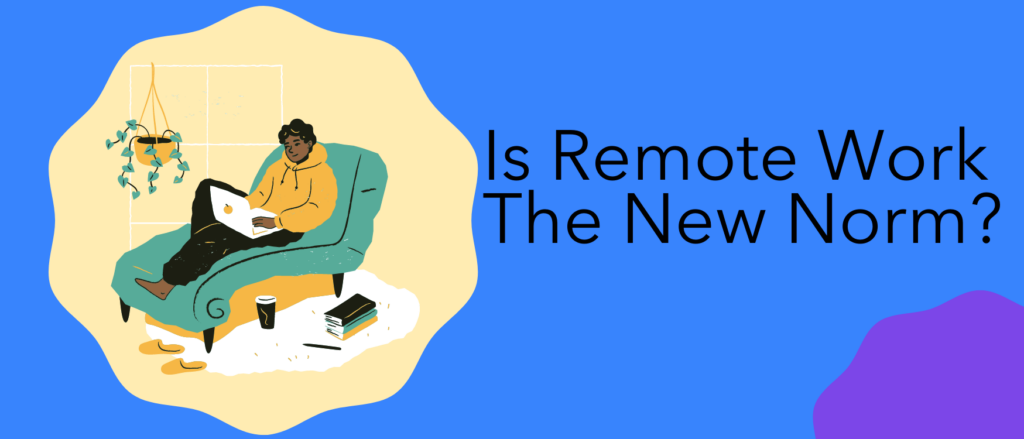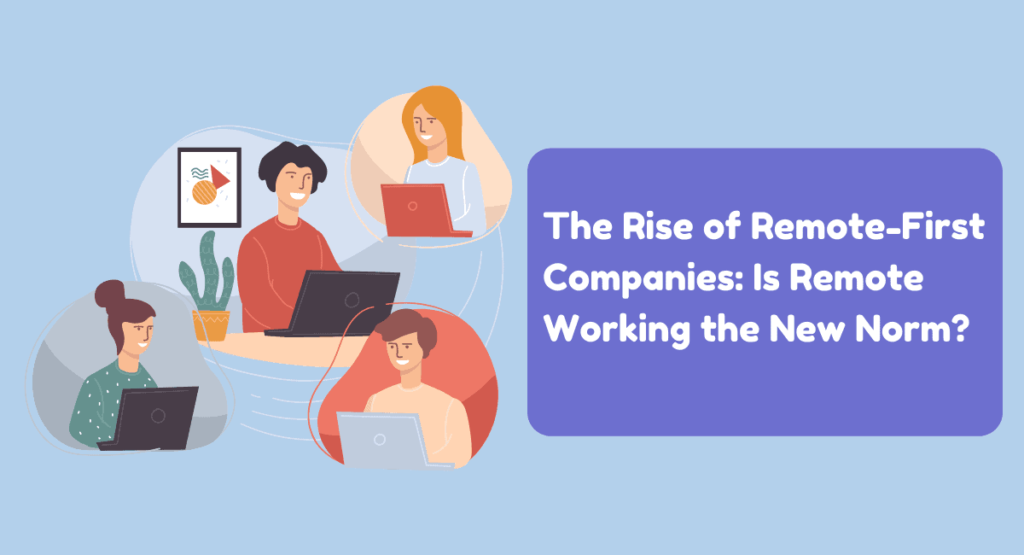The Rise of Remote-First Companies: Is Remote Working the New Norm?


We may work in different hours and time zones, and many people work from home or elsewhere. According to a study by Gallup, 37% of workers in the United States telecommute at least some time. Employees working remotely will increase as more organizations adopt remote work policies.
There are many benefits to working from remote locations, such as increased productivity and flexibility.
This blog post will explore the rise of remote work and remote-first workplaces.
Let’s dive in!
What is a remote-first company?
“Organizations can’t take a “wait-and-see” approach to flexible, remote working”. EY.
Remote-first organizations consider remote working the preferred method. Remote working is expected and encouraged. This varies from business process to business model to market and positioning.
Many remote-first companies provide space for people who need to work outside their offices. Nevertheless, there has been growing interest to be (or become) an isolated firm spread across multiple time zones.
Remote working affects every aspect of business operations, including how staff uses hardware and software and manages meetings and internal communications.
Work remotely meaning

The remote work model generally refers to employment that allows employees to work outside a traditional office.
However, the definition of remote work has changed because of new technology and changes in today’s workforce.
In its simplest form, remote work is any job that anyone can do from anywhere. This could mean working from home, in a coffee shop, or even on the road.
However, with the rise of mobile computing and cloud-based storage and collaboration tools, remote work has become a viable option for more jobs and businesses.
Working remotely has many benefits, including increased flexibility, freedom, and productivity. However, a few problems include feelings of loneliness and difficulty staying focused.
Whether you’re considering a job that allows remote work or already working remotely, it’s essential to understand the pro-cons of this type of employment.
The rise of telecommuting
Telecommuting is a type of remote work that allows employees to work from home or other remote locations outside the traditional office.
The popularity of telecommuting is on the rise for a variety of reasons. For employees, telecommuting can offer a better work-life balance, increase flexibility and freedom, and even increase productivity. For employers, remote work can help attract and retain top talent, save on office costs, and increase employee engagement.
The arrival of telecommuting has prompted organizations to become remote-first. A remote-first company is a company that designs its business around the needs of remote workers. This can include everything from hiring remote employees to providing them with the tools and resources to succeed.
Working remotely is clear, but some challenges come with this type of work.
Why should a company try to be remote-first?

Many companies are currently seeking to build remote workflow applications, which can be a productive way to bring remote workers into your company.
Technology improves communication efficiency. Consequently, it provides a good balance between informative conversation and face-to-face time.
Most major corporations already embrace remote-first work. They have found that the lack of a commute saves time and energy and cuts back on office costs, including rent, furniture, and utilities.
What is a Fully Remote Company or a Remote-Only Company?
A fully remote company is a company that does not have any physical offices, and all employees work remotely. A remote-only company is a company where some employees work remotely. This means they can work from home, or any other place they want, as long as they have an internet connection.
Fully Remote Company
When you don’t have a physical office, remote workers can often feel disconnected from their team. To create a corporate culture in a fully remote company, managers need to be very intentional about communication and setting up regular video chats or other forms of communication.
It’s also essential to create opportunities for employees to connect offline, whether that’s through company-sponsored retreats or other events.
If you are thinking about working for a company that allows you to work remotely, there are some things you should be prepared for:
- You must ensure you have the right technology to support a remote workforce.
- You will need to build a strong culture of communication and collaboration.
- You will need to create opportunities for employees to connect offline.
Remote-Only Company
If you’re a remote-only company, you can attract top talent from all over the world.
One of the challenges of being a remote-only company is that you can’t rely on impromptu meetings or water cooler talk to build relationships between employees.
Instead, it would be great if you intentionally created opportunities for social interaction and built a strong communication culture.
What is remote work? What is working from home? Is it the same?

Remote employees work for a company but are not physically present in the office. They may work from home or from anywhere. Remote workers are self-employed individuals who work from home or a remote location. There are some similarities between remote work and working from home.
The most significant distinctions are that remote workers are not employed by a firm and do not have access to the same benefits as regular employees. They are self-employed and may work for multiple clients or companies. This means that they have more control over their work schedule and choose when and where they work.
Another key difference is that geographical boundaries do not bind remote workers. They can live in any country and work for companies based in another country. This gives them flexibility and freedom to choose where they want to live and work.
Finally, remote workers tend to have more relaxed dress codes than office-based workers. This is because they are not required to be present in an office environment and can dress more casually when working from home or a remote location.
Overall, there are many key differences exist between remote work and working from home.
The challenges of remote worker

The challenges of remote workers can include a lack of social interaction, isolation, distractions, and a lack of structure. Working from remote locations might be challenging if you’re not used to it or aren’t disciplined. It’s important to set boundaries for yourself and stay organized to stay focused and productive.
You can make working from remote locations fun and manageable. For example, you can take breaks to stretch or take a walk, listen to music or podcasts, have regular video calls with friends or colleagues, and schedule time outside work.
How do people work remotely?
Remote work, or telecommuting, has been around for decades. But what’s new is the rise of co-working spaces, telecommuting, and the opportunities available to virtual workers today, thanks to emerging technologies like mobile computing, cloud storage, video conferencing, Software as a Service, and more.
There are various ways to work remotely, but telecommuting, co-working, and virtual work are the most common.
Telecommuting occurs when an employee works from a remote location or home. This can be full-time or part-time.
Co-working is when workers share an office space, often a co-working space or business center. This can be beneficial for networking and collaboration.
Virtual work is when employees work online from anywhere in the world. This work has become more popular with online communication and collaboration tools.
The benefits of working remotely are vast. Employees can save on commuting costs, dress code expenses, and workplace distractions. They also have greater flexibility with their schedules and can often take advantage of a more relaxed work-life balance.
However, working remotely has some challenges to consider. Working from home might feel lonely and be tough to stay concentrated without a set routine. There’s also the potential for distractions at home, such as family, pets, and household chores.
Overall, working remotely is an excellent option for many people. It offers many benefits and flexibility that traditional office jobs don’t provide. If you’re considering making the switch to remote work, you should keep a few things in mind.
- Decide what type of remote work is right for you.
- Ensure you have the necessary tools and resources to be successful.
- Create a plan to stay connected and focused.
Remote job on the road while you travel around the world.
Telecommuting and remote work opportunities are rising as more and more companies adopt remote-friendly policies. You may want to take your work on the road at some point. Whether traveling for leisure or visiting family and friends, here are a few tips to help you manage your remote work while traveling.
Before you pack your bags and head out the door, it’s crucial to have a plan. Let your boss or company know that you’ll be working from a different location and discuss any potential challenges. For example, if you’re traveling to a different time zone, you’ll need to make sure you’re available during your company’s business hours.
Once you’ve sorted out the logistics with your employer, it’s time to start planning your trip. When choosing a destination, keep in mind the type of work you do and the internet speeds available in the area. If you need to be online for video conferences or phone calls, make sure there is a reliable high-speed internet connection where you’ll be staying.
Take advantage of your new surroundings and explore if you’re traveling for leisure! But, if you’re visiting family or friends, remember to set boundaries so you can get your work done. Even though you’re on vacation, let people know that you still have a job to do.
Working from a remote location while traveling can be a great experience with a little bit of planning. Stay organized, keep your employer in the loop, and enjoy your time away from the office!
Common misconceptions about working remotely

Some misconceptions about remote working:
- Some people think that remote teams are less productive or that remote-friendly companies are just start-ups with no office space. But the reality is that there are a lot of remote-first firms that are succeeding. Studies have shown that remote workers are more productive than their office-bound counterparts.
- Another misconception is that remote-first companies are unprofessional. This is another common misconception about remote work. While it is true that some remote-first companies are less formal than traditional companies, this doesn’t mean that they’re unprofessional. Most remote-first companies are just as professional as any other company.
- Assuming that all remote workers are digital nomads is another misconception about remote work. Just because someone works remotely doesn’t mean they’re constantly traveling. Most remote workers prefer to stay in one place. They may occasionally travel for business or pleasure, but they usually have a home base where they live and work.
So if you’re thinking about going remote, don’t let these common misconceptions hold you back.
When you have a little bit of planning, you can be just as successful as a traditional worker.
Manage work-life balance when you work remotely

When you work outside the traditional office, finding a good balance between work and personal life is essential. This can be hard to do, but there are some things that you can do to make it easier. For example, try to set specific times when you will work and take a break.
You might also want to find a quiet place in your home to work so that you can focus and get things done. And, if you have kids, it might be a good idea to find childcare or make arrangements with your partner to have some time to work uninterrupted.
Working remotely can be a great way to improve your work-life balance, but it is essential to be intentional. Otherwise, it can be easy to let work take over your life and never have time for yourself or your family.
Conclusion
It’s difficult to predict whether working from home or remote locations will become the norm. Although there is still resistance to it, more and more employees are beginning to understand the advantages of telecommuting and remote working.
Information technology and telecommunication services make it easier than ever for people to stay connected no matter where they are. Highly possible that this trend will continue to grow in popularity.
So what does this mean for you? If you’re looking for a job, ensure to highlight your remote working experience in your resume and portfolio. And if you’re already employed, ask your boss about the possibility of starting a telecommuting arrangement.
The future of work is trending towards remote working, so it’s important to get on board now.


